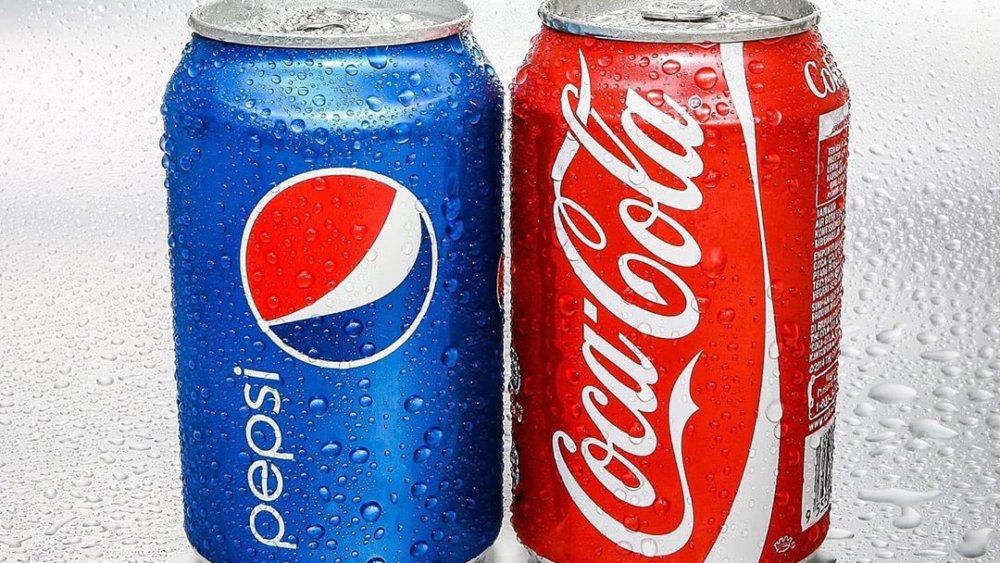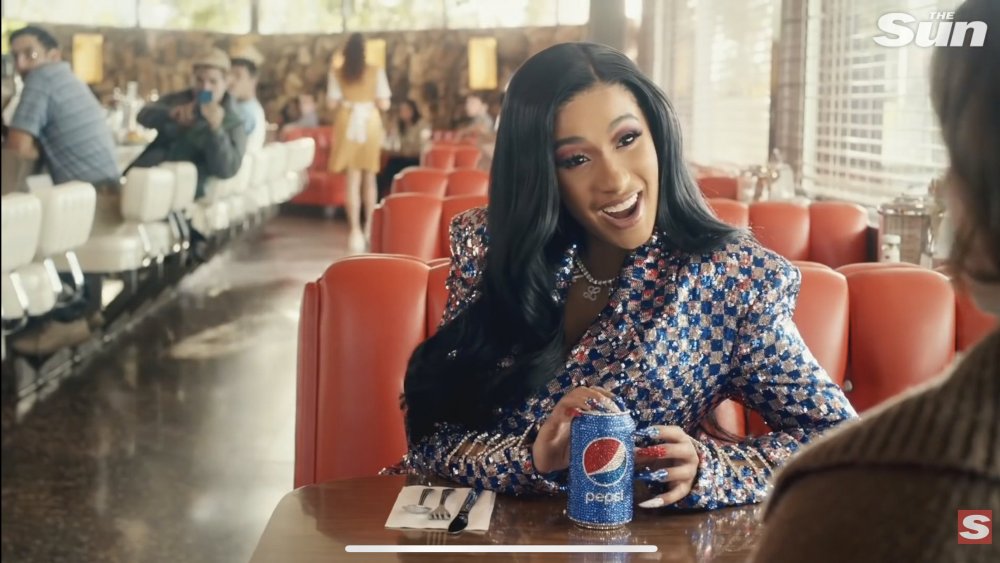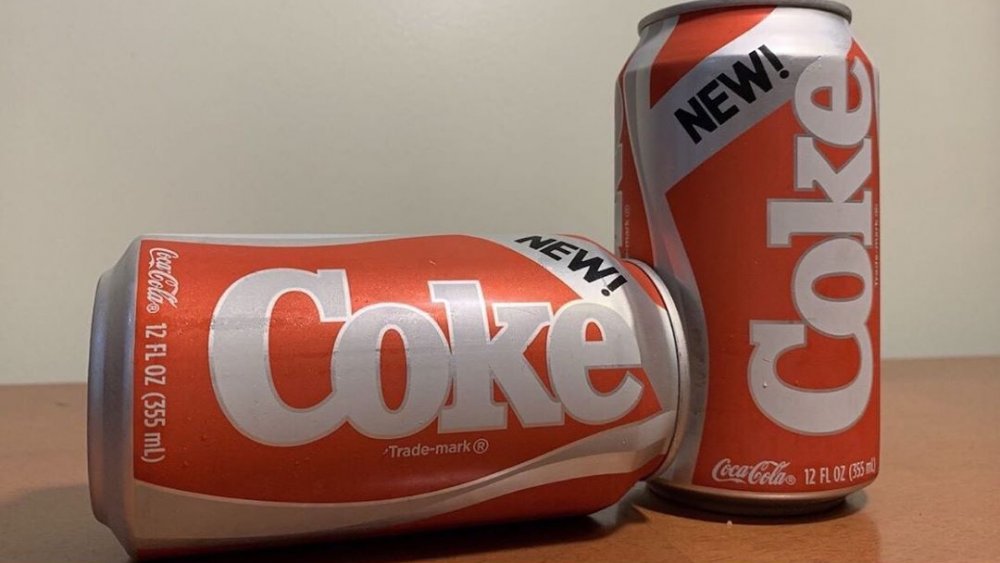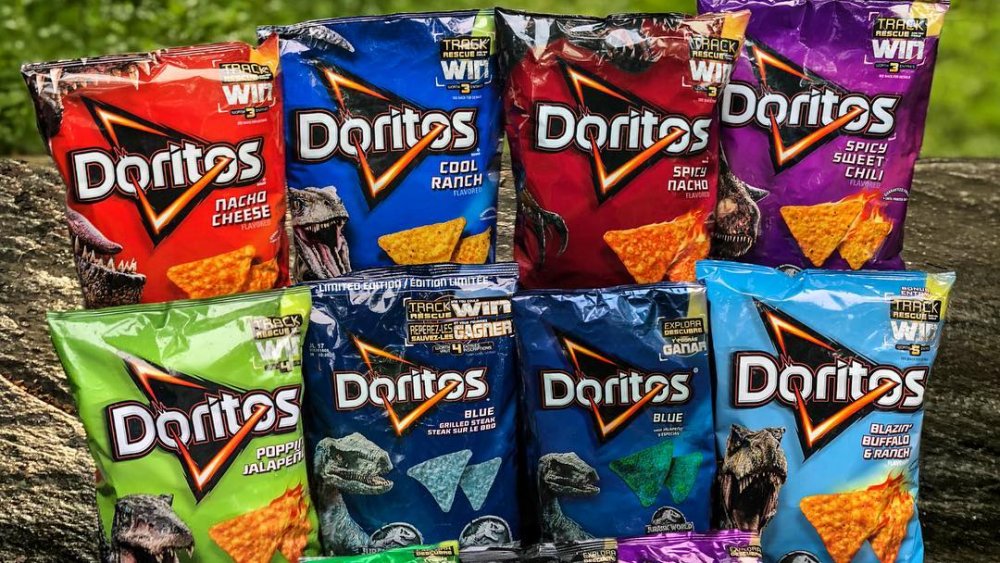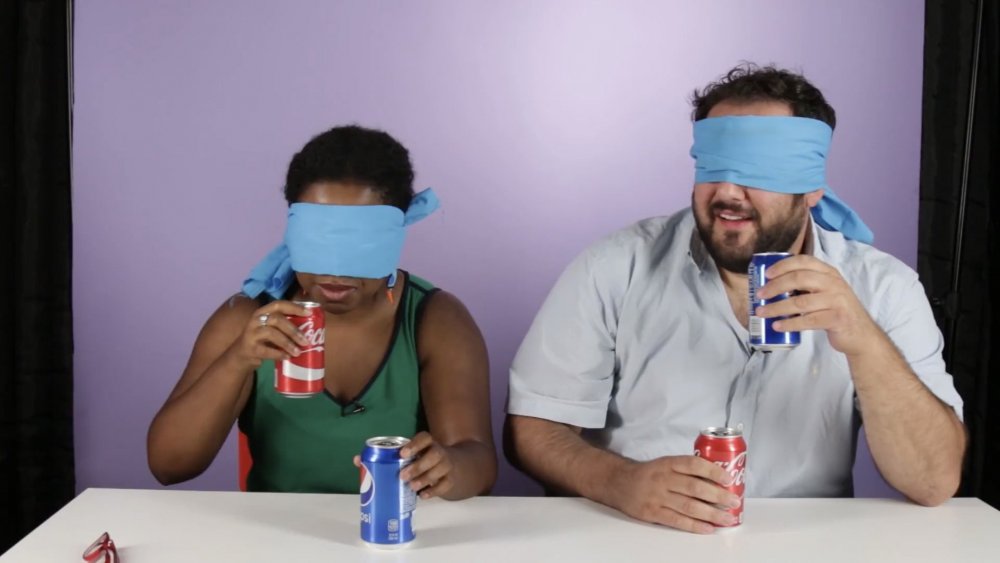Unpopular Opinion: Why Pepsi Is Better Than Coke
We know Coke is winning the cola wars. Coca-Cola's flagship beverage has a larger share of the soft-drink market than PepsiCo's main product (via Statista). Coke is found in more fast-food restaurants than Pepsi (via Business Insider), including McDonald's, Subway, and Burger King. Pepsi has been the challenger to undisputed champion Coke since day one. Inventor Caleb Bradham dubbed his new beverage Pepsi-Cola in 1898 (via Britannica) because he was inspired by the success of Coca-Cola, which first appeared 12 or so years earlier (via The Street).
While Pepsi was marketed to compete with Coke, the original cola beverage was formulated by a Confederate Army vet who sought a substitute for the morphine he had become dependent on during the Civil War – at least, according to The Street. So the original Original Coke – cocaine and all – can also claim a more colorful origin story. Despite all of Coke's apparent advantages, we take the unpopular stance that Pepsi is actually better than Coke. Maybe after reading this, you'll agree.
Pepsi has better commercials
Pepsi and Coke would be nothing without their marketing campaigns. How else can we account for two versions of brown, carbonated sugar water achieving billions of dollars in global sales? Coke's branding has been about togetherness and sharing, from the iconic 1971 TV ad showing young people from around the globe singing, "I'd like to buy the world a Coke," to the famous Mean Joe Greene commercial and beyond. The underdog Pepsi called itself "The Choice of a New Generation" in the 1980s (via Business Insider). With its attempts at youth appeal, Pepsi produces better commercials overall.
Pepsi made a splash during the 2019 Super Bowl with its "Pepsi is more than OK" commercial, with Steve Carrell, Cardi B, and Lil Jon (via AdAge). Pepsi again asserted its cultural relevance in a 2020 Super Bowl commercial, which featured Black female musical stars Missy Elliot and H.E.R. Meanwhile, Coke signaled "we're not really trying" with an animated Super Bowl commercial in 2019 with no stars – or human beings, for that matter – that rehashed the company's old "difference is good" message. In 2020, Coke went to the Super Bowl to plug its new energy drink with not-so-hip celebrities Jonah Hill and Martin Scorcese (via Daily Motion). Advertising is geared toward young people in order to build lifelong loyalties and pull at their discretionary dollars (via Marketplace). At 36 and 77 years old respectively, Hill and Scorcese are a combined 113 years of age.
Pepsi didn't make the worst product decision ever
Pepsi changed its formula under new ownership in the 1930s. But that change is more or less lost to history, whereas Coca-Cola's infamous decision to stop production of its original formula after 99 years and unveil New Coke stands as one of the worst marketing decisions by a major company.
Pepsi's best ad campaign – and arguably one of the most successful ad campaigns by anyone ever – was the Pepsi Challenge, launched in 1975 (via Business Insider). The commercials repeatedly showed ordinary citizens choosing Pepsi over Coke in blind taste tests. The ads worked so well that Coke's market advantage over Pepsi started to slip. In fact, grocery store sales began to favor Pepsi. Coke maintained its overall lead thanks only to more vending machines and deals with fast-food chains (via Slate).
Coke execs panicked. They fiddled with recipes for years, finally coming up with a flavor that beat both Pepsi and original Coke in blind taste tests (via Snopes). They launched New Coke and canned the old in 1985. The top brass at Coca-Cola didn't anticipate the ensuing backlash. The response was so strongly negative that Coca-Cola announced within three months of New Coke's introduction that it would bring back the original. With two versions of Coke on the market, Pepsi very briefly became the No. 1 soft drink in the U.S.
Pepsi has better side products
Coca-Cola Co. and PepsiCo are about more than Coke and Pepsi. Coca-Cola offers some 400 brands, all of which are beverages and many of which are not found in the U.S. (via The Wall Street Journal). PepsiCo makes Mountain Dew, Gatorade, Lipton Tea, and Naked juice, among others. Pepsi's products often outperform similar offerings from Coca-Cola.
Coke ran into a brick wall when it tried to go head-to-head with Mountain Dew. The soft drink Surge, labeled "Mountain Dew Killer" behind the scenes at Coke, had its ardent fans but disappeared from nationwide circulation in 2002, five years after its release. PepsiCo's Gatorade is far and away the king of sports drinks. It has more than four times the market share of Coca-Cola's Powerade (via CNBC). When it comes to fresh, healthy juices, you might prefer Coca-Cola's Odwalla over Naked. That's nice for you, except that Coke just announced it was discontinuing Odwalla due to a lack of sales growth (via San Francisco Business Times). Coca-Cola will start pulling Odwalla off store shelves in August.
Finally, Pepsi has something really huge that Coke doesn't. PepsiCo merged with Frito-Lay in the 1960s, and now snacks make up about half of PepsiCo's revenue. Coca-Cola's portfolio, on the other hand, is all beverages. This accounts for Pepsi's better performance in the stock market, according to The Street. Say what you will about Coke's dominance in soft drinks. Pepsi is a better investment.
Team Pepsi or Team Coke? Keep an open mind
Sticking with the financial argument, PepsiCo has fared better than Coca-Cola during the COVID-19 pandemic. Coca-Cola's sales declined 28 percent, due to the virtual disappearance of the business it normally does at restaurants, movie theaters, and sports stadiums (via The Wall Street Journal). Meanwhile, PepsiCo's sales were flat, as Frito-Lay snacks made up for the drop in soda sales. Snack foods are one of the few business sectors doing well during the pandemic.
While we've made the argument for Pepsi, we would like to conclude on a Coca-Cola-ish note, with an appeal to togetherness. When Buzzfeed conducted a blind taste test of Coke and Pepsi, tasters had a hard time telling the difference. They decided that people's preferences for one or the other were based more on brand identity. As it turns out, the two combatants in the cola wars are more about image than substance.
This is how Columbia Business School professor Bernd Schmitt put it, in a video for Vanity Fair: "What is absolutely amazing is that you have something like sugar water, basically, with a secret formula, and it's being stylized into grand battles of values and ideals, and how a society should be governed, and it's all in there, in the advertising." Or, as a taste-tester at Buzzfeed put it, "If you close your eyes and you just, you know, live a little, you might learn to like the other side."
